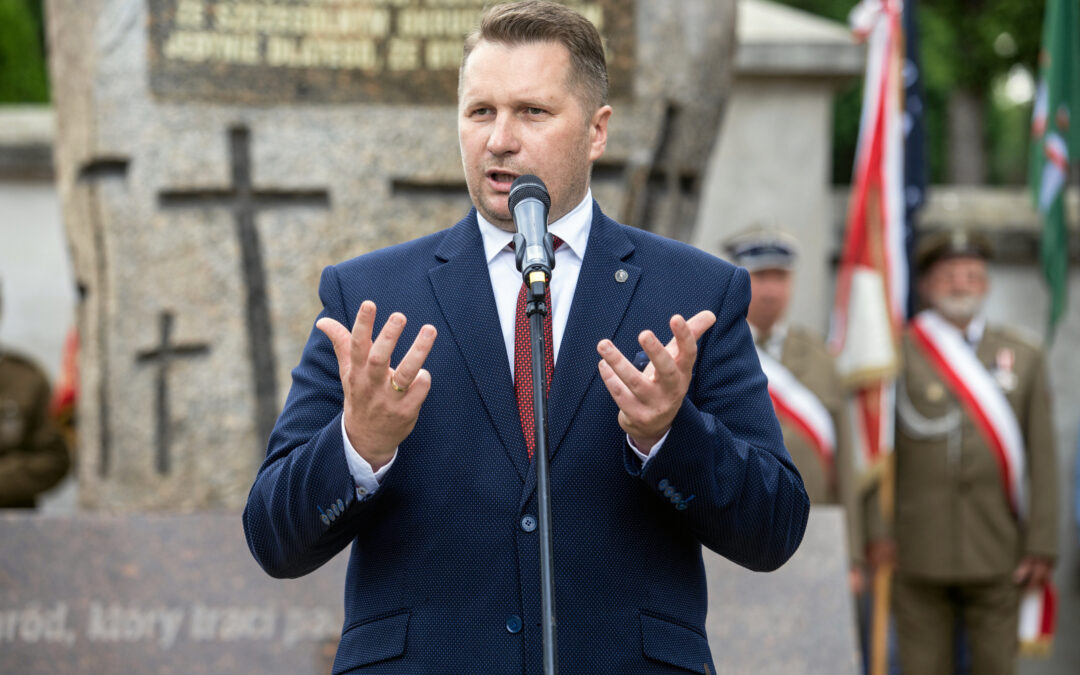Poland must remain Christian or it will not exist at all, says the country’s education minister, Przemysław Czarnek. His remarks follow recent comments in which Czarnek called for Poland to lead a “counter-revolution” against the “putrid, anti-religious activities” of the West.
The minister, known as an ultraconservative figure in Poland’s right-wing government, attended the 10th “Pilgrimage of Men” on Saturday. He told participants that it is “up to us whether we will transfer our Christian heritage to future generations”, reports the Polish Press Agency (PAP).
“This is our responsibility, our duty,” he declared. “We are the sum of our whole Christian heritage, over a thousand years…Poland will either be Christian or it will not exist.”
Minister Czarnek: Polska albo będzie chrześcijańska, albo jej nie będzie#PAPinformacje https://t.co/HNlEGJs66L @CzarnekP
— PAP (@PAPinformacje) September 10, 2022
Citing a sermon by former Polish Pope John Paul II, Czarnek warned that “man cannot be understood without Christ and man is unable to understand himself without Christ. He is not able to say who he is, what his goal in life is, without Christ”.
“Every misfortune in the world results from the fact that someone does not follow one or another of God’s commandments,” the education minister continued, adding that, if everyone obeyed those commandments, there would be no misfortune in the world.
Likewise, one cannot understand Polishness without Christianity. “Those who today not only throw off Christian values, but fight against them, are trying to forcefully throw out the key to understanding Polishness,” he declared.
And it is this, he continued, that has contributed to Poland’s survival as “a great, strong nation between Russia and Germany…If there were only those among us who cut off – who sawed off – Christianity, we would probably be speaking Russian or German today”.
Those remarks referenced a comment by a politician from the opposition Civic Platform (PO) party last year, who called for the “sawing off” of “Catholic privileges”. In response, Czarnek warned at the time that “one of PO’s main goals is to de-Christianise Poland following the example of what is happening in the West”.
The education minister expounded further on that theme at a conference in Warsaw last week on religious freedom. “If we do not want to be the West – in the cultural sense of this putrid, anti-religious activity – then we must be counter-revolutionaries,” he declared.
“We must realise that we are on the front line of a culture war…a brutal revolution,” said Czarnek. “Everything related to Christianity, Catholicism, religion as such, is ridiculed and spat upon.”
That is why, said the education minister in his remarks this weekend, the teaching of history is so important, to ensure that Poland’s Christian heritage is transmitted to future generations.
Poland’s adoption of Christianity is generally dated to the year 966, when the country’s first ruler, Mieszko I, was baptised. Today it has one of Europe’s highest levels of religiosity, with around 84% of the population identifying as believers (the vast majority Catholics) and 42% practising their faith at least once a week.
Christianity has been closely intertwined with the country’s history and identity, including Poles’ resistance to foreign occupations in the 19th and 20th centuries and to Soviet-imposed communism after World War Two.
However, recent years have also seen a gradual weakening of religious faith, and the Catholic church has been hit by child sex abuse scandals and accusations of political interference.
Its position has been strongly defended by the ruling national-conservative Law and Justice (PiS) party, whose leader, Jarosław Kaczyński, has warned that the church is the “repository of the only moral system commonly known in Poland” and that “rejection of it is nihilism”.
Main image credit: Jakub Orzechowski / Agencja Gazeta

Daniel Tilles is editor-in-chief of Notes from Poland. He has written on Polish affairs for a wide range of publications, including Foreign Policy, POLITICO Europe, EUobserver and Dziennik Gazeta Prawna.




















